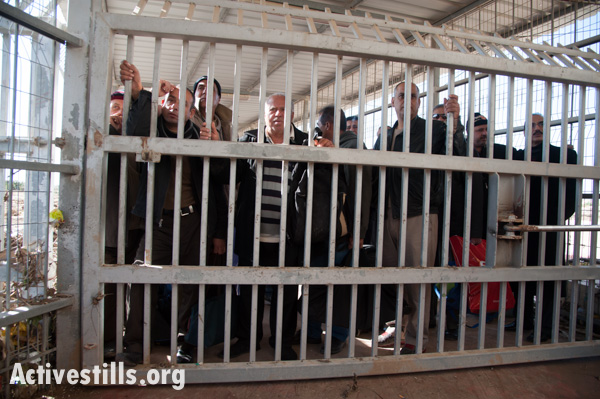COGAT’s new Facebook page will not hide the fact that with every ‘like’ it receives, the occupation becomes more permanent in our minds.

A few weeks ago, the Coordination of Government Activities in the Territories (COGAT) unit launched its own Facebook page. COGAT, which operates under Israel’s Ministry of Defense, controls the blockade of the Gaza Strip through the land crossings; it allocates land and resources to the Jewish settlements in the West Bank; it prevents Palestinian development in Area C and oversees demolitions against Palestinian homes; it accepts or rejects Palestinian permits to enter Israel; and it facilitates the cooperation between the Israeli military and the Palestinian security forces, among other roles. To put it simply: COGAT is responsible for managing the Israeli occupation.
The timing of COGAT’s new social media outlet is no secret. As the tide of international opinion and pressure increasingly turns against Israel’s occupation — a trend that is being felt from government halls to university campuses to the media — COGAT’s Facebook page serves as an online tool to help state employees, ordinary Israeli citizens and their supporters present a more positive and “benevolent” image of Israel’s control of the occupied territories.
So far, the page has mostly posted infographics that show the numbers of vehicles passing through the Erez and Kerem Shalom crossings, the types of goods being transported into the Gaza Strip, and other related statistics. Since the start of Ramadan a few days ago, the page has also posted images of Palestinian Muslims crossing into Israel to attend Friday prayers in Jerusalem.
While the graphics are impressive, they are still nothing short of laughable. For one, COGAT’s page is in English, but not in Arabic or Hebrew, making it obvious that the target audience is not the Palestinian people it is claiming to assist, but rather foreigners observing the conflict from afar. The language used on the page demonstrates Israel’s poor attempt to counter the global position on the occupation, by promoting terms and hashtags such as “Judea” and “Samaria” instead of “West Bank” or “Palestinian Territories.” The photos of Muslims in Jerusalem include captions describing them as praying on “the Temple Mount” rather than the Haram al-Sharif, Dome of the Rock or Al-Aqsa Mosque, further displaying its complete inconsideration for its Palestinian subjects.
In addition to its regular posts on activities at the crossings, COGAT released a video this week of Israeli Major General Yoav Mordechai delivering Ramadan greetings in Arabic. In it, Mordechai said that he had “personally instructed” steps to “strengthen the local [Palestinian] economies,” and that he has “decided to increase entry of Palestinians” into Israel for prayers and family visits — as if the Israeli authorities were making a generous choice by providing these services.
#Ramadan Kareem from Major General Yoav ‘Poli’ Mordechai
Posted by COGAT – Coordination of Government Activities in the Territories on Tuesday, June 16, 2015
The video does not mention, of course, that Israel is actually obliged to facilitate these activities as an occupying power under international law, and has had to be repeatedly pressured into fulfilling even part of those obligations by the international community. Moreover, those services are not supposed to be privileges or gifts bestowed upon the Palestinian people; they are their basic human rights.
The posts are particularly insulting because they pretend that the Palestinians and the international community would simply forget that the rubble that still covers much of Gaza was primarily caused by Israeli missiles and artillery; that the severe restrictions on movement and goods in both the West Bank and Gaza are due to Israeli checkpoints and denial of permits; or that the economic and natural resources that could help rehabilitate the Palestinians’ welfare are routinely blocked and hijacked by the Israeli authorities. As Samah Salaime wrote on +972’s Hebrew sister site, Local Call, the posts are not fooling anyone — they merely “remind the Arabs who is boss.”
At the time of this writing, COGAT’s Facebook page only has about 1,000 likes, and this writer is aware that this article may regrettably increase the page’s publicity. But it is worth doing so just to highlight a key issue reflected in the page. By attempting to normalize and “beautify” its dominion over the lives of Palestinians, COGAT — by design or by accident — is making the West Bank and Gaza appear as if they are provinces (read “bantustans”) of the Israeli state. Though this is hardly anything new, it illustrates how much Israel has incorporated the occupation into its national consciousness, which more accurately reflects the facts on the ground and the country’s right-wing political objectives.
COGAT’s Facebook page thus may be a tool for Israelis to assist the state’s current PR battles, but it will not hide the fact that, with every “like” it receives, the occupation becomes more permanent in our minds, and its colonial and apartheid-like rule becomes all the more clear.


